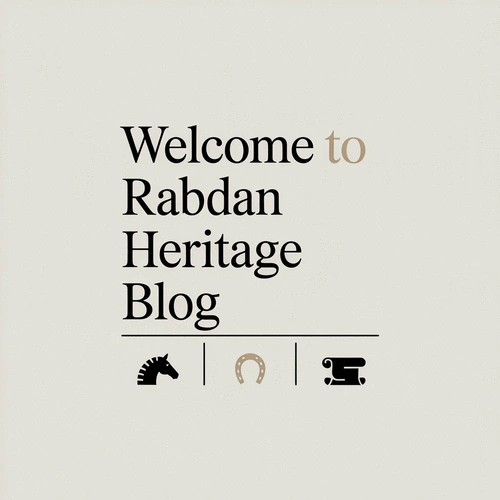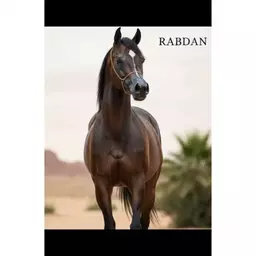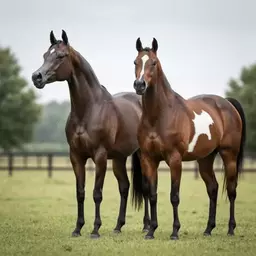As we explore the rich tapestry of Arabian horse heritage, understanding its historical context becomes paramount. The legacies of these majestic creatures provide a lens through which we can appreciate not just their beauty, but also the traditions and values that have shaped their existence through the ages.
What You Will Learn
- The importance of genetic purity in preserving the unique traits of Arabian horses.
- Key historical figures, such as Mohammed Ali and Abbas Pasha, and their contributions to Arabian horse bloodlines.
- The cultural significance of Arabian horses in Bedouin society and their role as symbols of wealth and status.
- Differences between the Straight Egyptian and Rabdan bloodlines, and how they influence performance and health traits.
- How to make informed breeding or purchasing decisions based on bloodline characteristics aligned with your equestrian goals.
A Tale of Two Bloodlines: Straight Egyptian vs. Rabdan Arabian Horses
Delve into the distinct characteristics and historical significance of two prominent Arabian horse bloodlines.
Straight Egyptian Bloodline
Regarded as the epitome of Arabian horse culture, Straight Egyptian horses maintain a direct link to traditional Bedouin tribes.
- •Heritage: Direct link to Bedouin tribes, genetic purity.
- •Health: Known for resilience and fewer genetic disorders.
- •Market Value: High due to rarity and demand for purity.
Preservation of unique traits like endurance and beauty.
Rabdan Bloodline
Celebrated for its adaptability and contributions to modern breeding practices, showcasing a blend of historical strength.
- •Heritage: Blend of historical strength and modern breeding.
- •Health: Diverse health traits, contributing to varied breeding programs.
- •Market Value: Influenced by unique traits and demand.
Remarkable adaptability and modern breeding contributions.
Understanding the Historical Context of Arabian Horse Bloodlines
As an enthusiast of Arabian horses, I often reflect on the rich history that surrounds these magnificent creatures. It's vital to grasp the historical context of Arabian horse bloodlines, as it provides insight into their significance in equine culture. Understanding the genetic purity of these horses not only helps maintain their heritage but also enhances our appreciation for the traditions that have shaped them over centuries.
The concept of pureblood status is essential in preserving the unique traits of Arabian horses. This status ensures that each generation reflects the qualities of its ancestry, fostering a sense of continuity in the breed. By tracing back to the original bloodlines, we can celebrate the legacy of these noble animals and honor their historical significance. Further research into the genetic diversity and population structure of Arabian horses can provide deeper insights into their lineage.
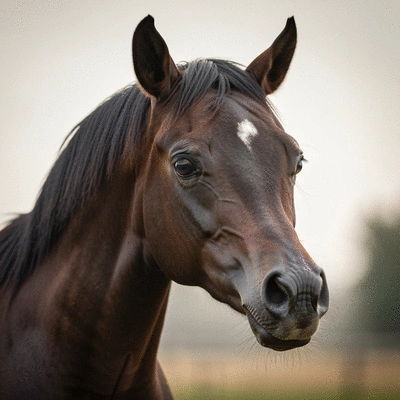
Significance of Genetic Purity in Arabian Horses
Genetic purity plays a crucial role in maintaining the esteemed lineage of Arabian horses. Here are some key points to consider:
- Preservation of unique traits, such as endurance and beauty.
- Ensuring the health and vigor of future generations.
- Facilitating successful breeding practices that honor historical bloodlines.
Maintaining genetic purity is not just a technical aspect; it’s a commitment to honoring the history of Arabian horses. As we uphold this purity, we contribute to the ongoing legacy of these precious animals, ensuring their relevance in today's equestrian world.
The Role of Key Figures in Arabian Horse History
Throughout history, certain figures have had a profound impact on the preservation of Arabian horse bloodlines. Notably, Mohammed Ali and Abbas Pasha played pivotal roles in establishing and maintaining these esteemed lineages. Their efforts were instrumental in fostering a breeding culture that emphasized quality over quantity.
For example, Mohammed Ali founded the royal stables in Egypt and imported horses from the Arabian Peninsula to enhance his breeding stock. Abbas Pasha continued this legacy by focusing on the conservation of purebred Arabian horses, which has had lasting effects on the breed’s development. For more detailed information on the genetic study of Arabian horses and its challenges to common beliefs, explore this resource from Cornell University.
The Cultural Significance of the Arabian Horse
Arabian horses have held a prominent place in Bedouin society and beyond, symbolizing strength, endurance, and beauty. Their historical and cultural roles extend beyond mere companionship or work animals; they are revered as treasures of heritage. The bond between the Bedouins and their horses exemplifies a deep mutual respect that has lasted for centuries.
In Bedouin culture, horses were often seen as a measure of wealth and status. Today, this cultural significance continues to resonate, not only in the Middle East but across the globe. Understanding the cultural tapestry surrounding Arabian horses enriches our appreciation of their heritage and reminds us of their enduring legacy. A study on the genetic structure of Arabian horses in Saudi Arabia further highlights their regional importance.
Pro Tip
When considering a breeding decision or a horse purchase, always prioritize the health traits associated with each bloodline. For instance, the Straight Egyptian bloodline is known for its resilience and fewer genetic disorders, while the Rabdan bloodline exhibits remarkable adaptability. By focusing on these aspects, you can ensure a thriving future for your equestrian companions.
Summary of Key Historical Differences
When we delve into the rich history of Arabian horse bloodlines, two prominent lineages emerge: the Straight Egyptian and the Rabdan bloodlines. Each bloodline bears unique characteristics shaped by the traditions and practices of their caretakers. Understanding these distinctions helps us appreciate their heritage, performance capabilities, and market value.
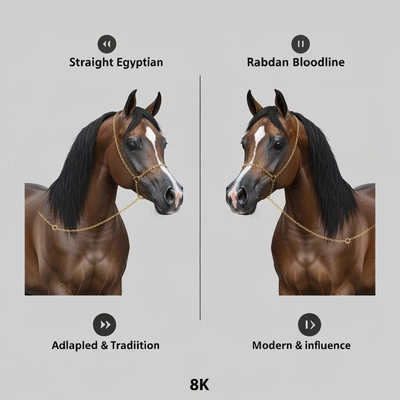
The Straight Egyptian bloodline stands out for its preservation of genetic purity and traditional Bedouin roots, often regarded as the epitome of Arabian horse culture. In contrast, the Rabdan bloodline is celebrated for its remarkable adaptability and contributions to modern breeding practices. This distinction influences not only their historical significance but also their current standing in the equestrian community.
- Heritage: Straight Egyptian horses maintain a direct link to Bedouin tribes, while Rabdan horses showcase a blend of historical strength and modern breeding.
- Performance: Each bloodline exhibits unique traits that impact their performance in various equestrian disciplines.
- Market Value: The rarity and demand for each bloodline dictate their market presence, affecting both buyers and breeders.
As I reflect on these differences, I can't help but think about the stories that each bloodline carries. They are more than just horses; they are living legacies of a culture and history that continues to shape our understanding of the Arabian breed.
Making an Informed Choice for Breeding or Purchase
Choosing between the Straight Egyptian and Rabdan bloodlines is not merely a decision about lineage; it's about aligning your equestrian goals with the unique traits of each bloodline. As you consider your options, think about what you value most in a horse—be it performance, temperament, or historical significance.
Are you drawn to the elegance and grace of a Straight Egyptian horse, or do you find yourself captivated by the robust adaptability of a Rabdan? Each choice reflects not only your personal preferences but also your vision for the future of your equestrian pursuits. Together, we can explore these passions!
Evaluating Bloodline Contributions to Equine Health
Equine health is paramount in breeding decisions, and understanding the health traits associated with each bloodline is essential. Both the Straight Egyptian and Rabdan bloodlines offer unique genetic advantages that can influence the overall well-being of the horses.
- Straight Egyptian: Known for their resilience and fewer genetic disorders, these horses often showcase strong health traits that can be beneficial for longevity.
- Rabdan: With a history of adaptability, Rabdan bloodline horses may exhibit diverse health traits that can contribute to varied breeding programs.
As I’ve witnessed in my own experiences with Arabian horses, selecting a bloodline with strong health traits is crucial for fostering a thriving equine future. Health matters—and making informed choices today will help secure the well-being of tomorrow's champions!
Frequently Asked Questions About Arabian Horse Bloodlines
- What is the main difference between Straight Egyptian and Rabdan Arabian horse bloodlines?
- The Straight Egyptian bloodline is characterized by its direct link to traditional Bedouin tribes and a strong emphasis on genetic purity, often associated with resilience and fewer genetic disorders. The Rabdan bloodline, on the other hand, is celebrated for its adaptability and contributions to modern breeding practices, showcasing a blend of historical strength and diverse health traits.
- Why is genetic purity important for Arabian horses?
- Genetic purity is crucial for preserving the unique traits of Arabian horses, such as endurance and beauty, ensuring the health and vigor of future generations, and facilitating successful breeding practices that honor historical bloodlines. It helps maintain the breed's distinct characteristics and heritage.
- Who were Mohammed Ali and Abbas Pasha, and what was their impact on Arabian horses?
- Mohammed Ali and Abbas Pasha were key historical figures who played pivotal roles in preserving Arabian horse bloodlines. Mohammed Ali founded royal stables in Egypt and imported horses to enhance breeding stock, while Abbas Pasha continued this legacy by focusing on the conservation of purebred Arabian horses, significantly influencing the breed's development.
- What is the cultural significance of Arabian horses in Bedouin society?
- In Bedouin society, Arabian horses held a prominent place, symbolizing strength, endurance, and beauty. They were often considered a measure of wealth and status, revered as treasures of heritage, and formed a deep, mutual bond with their Bedouin caretakers.
- How do bloodline characteristics influence breeding and purchasing decisions?
- Understanding bloodline characteristics is essential for making informed breeding or purchasing decisions. For example, if longevity and genetic health are priorities, the Straight Egyptian bloodline might be preferred due to its known resilience. If adaptability and contributions to varied breeding programs are desired, the Rabdan bloodline could be a better fit. Aligning equestrian goals with specific bloodline traits ensures a more successful outcome.
Engagement and Further Learning
I invite you to share your experiences with either bloodline! Have you found a particular lineage that resonates with you? Engaging with fellow horse lovers can enrich our understanding and appreciation of these magnificent creatures. Join the conversation in the comments section below!
For those eager to learn more, I encourage you to explore additional resources related to Arabian horse history and breeding practices. Together, we can build a vibrant community that celebrates the legacy of the Arabian horse and its remarkable heritage! Let's continue this journey together!
Recap of Key Points
Here is a quick recap of the important points discussed in the article:
- Understanding the historical context of Arabian horse bloodlines enhances appreciation for their significance in equine culture.
- Genetic purity is crucial for maintaining the unique traits of Arabian horses, ensuring health and successful breeding practices.
- Key historical figures like Mohammed Ali and Abbas Pasha played significant roles in preserving Arabian horse bloodlines.
- Cultural significance of Arabian horses extends beyond utility; they symbolize strength, endurance, and beauty in societies.
- The distinction between Straight Egyptian and Rabdan bloodlines affects their heritage, performance capabilities, and market value.
- Making informed breeding or purchasing decisions involves aligning equestrian goals with the unique traits of each bloodline.
- Understanding health traits associated with each bloodline is essential for the well-being of Arabian horses.





